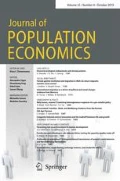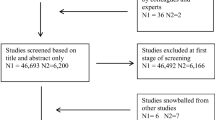Abstract.
This paper examines a wide variety of forms, and full histories, of family structure to test existing theories of family influences and identify needs for new theories. The focus is on links between childhood family structure and both completed schooling and risk of a nonmarital birth. Using a 27-year span of panel (PSID) data for U.S. children, we find that: (a) change is stressful, (b) timing during childhood is relevant, (c) adults other than parents are important, and (d) two more recently studied family structures (mother-with-grandparent(s) and mother-with-stepfather) do not fit the molds of existing theories. The findings suggest that new theories should consider allocation of resources and reasons people group into family structures.
Similar content being viewed by others
Author information
Authors and Affiliations
Additional information
Received: 11 September 1998/Accepted: 27 March 2000
Rights and permissions
About this article
Cite this article
Hill, M., Yeung, WJ. & Duncan, G. Childhood family structure and young adult behaviors. J Popul Econ 14, 271–299 (2001). https://doi.org/10.1007/s001480000039
Issue Date:
DOI: https://doi.org/10.1007/s001480000039




